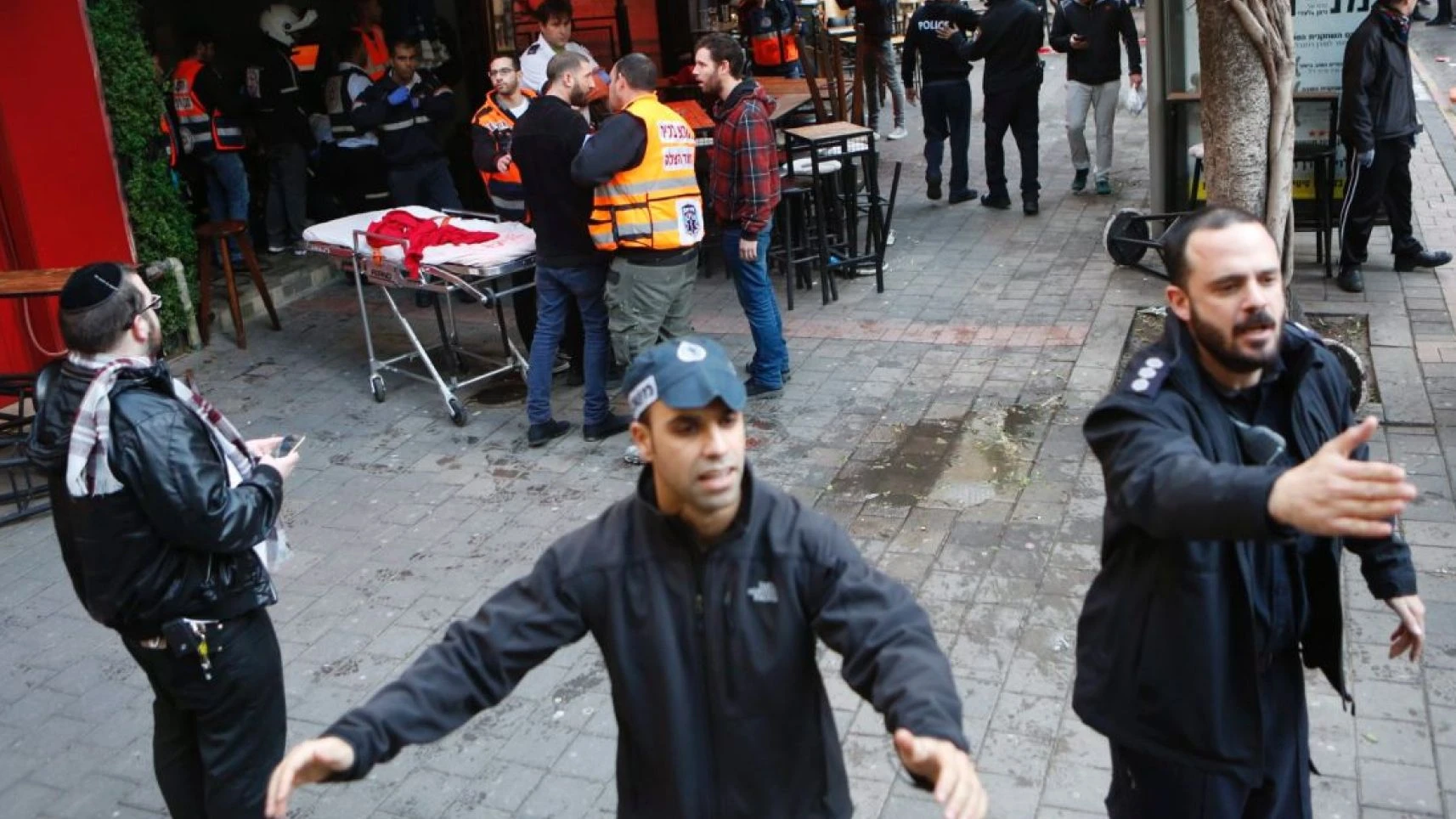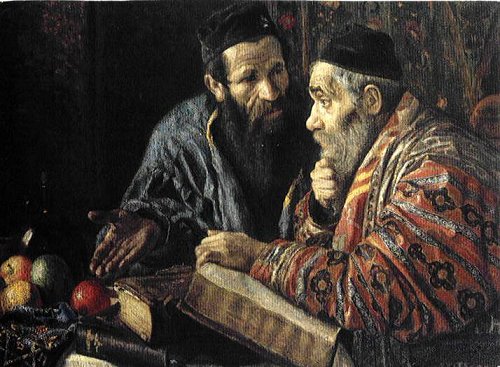A Road-Map to Peace in Israel
Moses Vs. Gandhi
- January 1, 2016
- |
- 20 Tevet 5776
Dov Greenberg
1884 views
Site of the terror attack in Tel Aviv, Friday, January 1, 2016.

A Road-Map to Peace in Israel
Moses Vs. Gandhi
Dov Greenberg
- January 1, 2016
Moses' Profile
As terror continues to threaten our brothers and sisters in Israel, let us turn to the greatest leader of the Jewish people, Moses, for a genuine road map toward peace and liberation.
The Hebrew Bible shares only three incidents about Moses' life prior to G-d choosing him as a leader and prophet (Exodus Chapter 2, this week's portion):
1) As a young man, Moses goes out among his brethren and sees an Egyptian overseer brutally beating a Hebrew. He strikes down the oppressor, burying him in the sand.
2) The next day, Moses attempts to bring peace between two Hebrews who are fighting, but the aggressor is indignant and says, "Who appointed you as a prince and leader over us? Do you mean to kill me as you killed the Egyptian?" Realizing that his intervention the previous day had already become known, Moses escapes from Egypt and finds refuge in Midian.
3) In Midian, Moses probably wants nothing more than peace and tranquility. Instead, he finds himself embroiled in yet another conflict. He witnesses the local shepherds bullying a group of girls who were first in line to draw water from a well. He immediately rises to their defense, driving off the offending shepherds.
These are the only episodes we know about Moses (besides the circumstances of his birth) prior to his selection by G-d as a leader, because they express a paradigm indispensable to leadership: A leader must have the courage to battle injustice wherever it exists. In all three instances, Moses is deeply committed to fighting injustice. He intervenes when a non-Jew oppresses a Jew, when two Jews fight, and when non-Jewish men oppress non-Jewish women. When it is necessary to kill, he is willing to kill. When it is sufficient to talk he is ready to talk; when it is necessary to fight, he is prepared to fight. One who rejects the choice of aggression out of a sense of compassion may be a kind human being but a wholly inadequate leader, because the long-term results of a failure to battle evil are far worse.Politically Incorrect
In modern terms, Moses is politically incorrect. He does not lecture the Egyptian taskmaster about "the cycle of violence" or give him a lesson on "rage management." Moses knows that by the time he will complete his lecture the Hebrew slave might be dead. Moses is aware that at times, violence is a moral, though difficult, choice. It saves the lives of the innocent.
Prohibiting moral killing, guarantees immoral killing. It is violence used by police that stops violent criminals from murdering and hurting innocent people. There are many innocent men and women alive today solely because someone used violence to save their lives. If someone had killed the hijackers of 9/11 before they commandeered the planes, thousands of lives would have been saved. If Someone killed the Hamas terrorists before October 7th 2023, thousands would be saved.Gandhi's Advice
Throughout history, many chose not to emulate Moses' example. During the Second World War, for example, when it appeared that Nazi Germany will attempt to capture England, Mahatma Gandhi offered the British the following advice:
"I would like you to lay down the arms you have which are useless for saving you or humanity. You will invite Herr Hitler and Signor Mussolini to take what they want of the countries you call your possessions. Let them take possession... If these gentlemen choose to occupy your homes, you will vacate them. If they do not give you free passage out, you will allow yourself, man, woman and child, to be slaughtered, but you will refuse to owe allegiance to them."
To the Jews of Germany Gandhi offered a similar message:
"I am as certain as I am dictating these words that the stoniest German heart will melt [if the Jews] adopt active non-violence. Human nature ... unfailingly responds to the advances of love. I do not despair of his [Hitler's] responding to human suffering even though caused by him." Had Gandhi convinced the English to lay down their arms and practice non-violence, the Jewish people would have been annihilated, democracy and human rights would have disappeared, and the world would have been plunged into a new Dark Age of unimaginable cruelty. War, while always unfortunate and painful, is not always evil; sometimes, fighting a war is the most moral thing to do.
Astonishingly, the nation that Moses created -- Israel -- has in recent years emulated Gandhi rather than Moses. With the Oslo accords, we invited our sworn enemies to take parts of our homeland in the belief that they would reciprocate with peace and good will. Instead of declaring outright war against the terrorists and their infrastructure, we chose to practice restraint and non-violent diplomacy. Many of us believed then, and some Jews still believe, that the stoniest terrorist heart will melt in response to our peaceful advances.Chamberlain and Churchill
In 1938, British Prime Minister Neville Chamberlain appeased Adolf Hitler, by allowing the German Fuhrer to occupy the Sudetenland for a mere promise of peace. Chamberlain then returned to England and announced that he had brought "Peace in our time." Winston Churchill denounced him as a naive appeaser who believed that he could buy Hitler's good will by giving in to his immoral demands. "You were given a choice between war and dishonor. You chose dishonor and you will have war."
Sadly, the same has transpired with Israel. By relinquishing parts of our homeland, Israel chose dishonor. In return, Israel received war. Today we are in the midst of the worst bloodletting in Israeli history. The relentless terror is a direct result of the tragic policy that believes in appeasing terrorists and not destroying them. Appeasement is suicidal for the innocent and ensures victory for the evil.
The terror war on Israel, like World War II, is a war against the Jews. Losing is catastrophic. Losing is not an option. This is no time for appeasement or restraint. This is a time for righteous might.
The prophets of Israel were the first to conceive of peace as an ideal. Isaiah gave voice to the great words engraved in the imagination of the West: "Nation shall not lift up sword against Nation; neither shall they learn war anymore." But the way to hasten Isaiah's vision is to fight evil, not allow it to flourish. At another time when the Jews needed to forcefully confront their enemies, the prophet Joel declared, "Beat your plowshares into swords, and your pruning hooks into spears." The use of moral violence must always be the last resort. But when all other attempts fail, righteous might is the only response to immoral violence.- Comment
Class Summary:
Rabbi Dov Greenberg is the director of Chabad at Stanford University
Moses' Profile
As terror continues to threaten our brothers and sisters in Israel, let us turn to the greatest leader of the Jewish people, Moses, for a genuine road map toward peace and liberation.
The Hebrew Bible shares only three incidents about Moses' life prior to G-d choosing him as a leader and prophet (Exodus Chapter 2, this week's portion):
1) As a young man, Moses goes out among his brethren and sees an Egyptian overseer brutally beating a Hebrew. He strikes down the oppressor, burying him in the sand.
2) The next day, Moses attempts to bring peace between two Hebrews who are fighting, but the aggressor is indignant and says, "Who appointed you as a prince and leader over us? Do you mean to kill me as you killed the Egyptian?" Realizing that his intervention the previous day had already become known, Moses escapes from Egypt and finds refuge in Midian.
3) In Midian, Moses probably wants nothing more than peace and tranquility. Instead, he finds himself embroiled in yet another conflict. He witnesses the local shepherds bullying a group of girls who were first in line to draw water from a well. He immediately rises to their defense, driving off the offending shepherds.
These are the only episodes we know about Moses (besides the circumstances of his birth) prior to his selection by G-d as a leader, because they express a paradigm indispensable to leadership: A leader must have the courage to battle injustice wherever it exists. In all three instances, Moses is deeply committed to fighting injustice. He intervenes when a non-Jew oppresses a Jew, when two Jews fight, and when non-Jewish men oppress non-Jewish women. When it is necessary to kill, he is willing to kill. When it is sufficient to talk he is ready to talk; when it is necessary to fight, he is prepared to fight. One who rejects the choice of aggression out of a sense of compassion may be a kind human being but a wholly inadequate leader, because the long-term results of a failure to battle evil are far worse.
Politically Incorrect
In modern terms, Moses is politically incorrect. He does not lecture the Egyptian taskmaster about "the cycle of violence" or give him a lesson on "rage management." Moses knows that by the time he will complete his lecture the Hebrew slave might be dead. Moses is aware that at times, violence is a moral, though difficult, choice. It saves the lives of the innocent.
Prohibiting moral killing, guarantees immoral killing. It is violence used by police that stops violent criminals from murdering and hurting innocent people. There are many innocent men and women alive today solely because someone used violence to save their lives. If someone had killed the hijackers of 9/11 before they commandeered the planes, thousands of lives would have been saved. If Someone killed the Hamas terrorists before October 7th 2023, thousands would be saved.
Gandhi's Advice
Throughout history, many chose not to emulate Moses' example. During the Second World War, for example, when it appeared that Nazi Germany will attempt to capture England, Mahatma Gandhi offered the British the following advice:
"I would like you to lay down the arms you have which are useless for saving you or humanity. You will invite Herr Hitler and Signor Mussolini to take what they want of the countries you call your possessions. Let them take possession... If these gentlemen choose to occupy your homes, you will vacate them. If they do not give you free passage out, you will allow yourself, man, woman and child, to be slaughtered, but you will refuse to owe allegiance to them."
To the Jews of Germany Gandhi offered a similar message:
"I am as certain as I am dictating these words that the stoniest German heart will melt [if the Jews] adopt active non-violence. Human nature ... unfailingly responds to the advances of love. I do not despair of his [Hitler's] responding to human suffering even though caused by him." Had Gandhi convinced the English to lay down their arms and practice non-violence, the Jewish people would have been annihilated, democracy and human rights would have disappeared, and the world would have been plunged into a new Dark Age of unimaginable cruelty. War, while always unfortunate and painful, is not always evil; sometimes, fighting a war is the most moral thing to do.
Astonishingly, the nation that Moses created -- Israel -- has in recent years emulated Gandhi rather than Moses. With the Oslo accords, we invited our sworn enemies to take parts of our homeland in the belief that they would reciprocate with peace and good will. Instead of declaring outright war against the terrorists and their infrastructure, we chose to practice restraint and non-violent diplomacy. Many of us believed then, and some Jews still believe, that the stoniest terrorist heart will melt in response to our peaceful advances.
Chamberlain and Churchill
In 1938, British Prime Minister Neville Chamberlain appeased Adolf Hitler, by allowing the German Fuhrer to occupy the Sudetenland for a mere promise of peace. Chamberlain then returned to England and announced that he had brought "Peace in our time." Winston Churchill denounced him as a naive appeaser who believed that he could buy Hitler's good will by giving in to his immoral demands. "You were given a choice between war and dishonor. You chose dishonor and you will have war."
Sadly, the same has transpired with Israel. By relinquishing parts of our homeland, Israel chose dishonor. In return, Israel received war. Today we are in the midst of the worst bloodletting in Israeli history. The relentless terror is a direct result of the tragic policy that believes in appeasing terrorists and not destroying them. Appeasement is suicidal for the innocent and ensures victory for the evil.
The terror war on Israel, like World War II, is a war against the Jews. Losing is catastrophic. Losing is not an option. This is no time for appeasement or restraint. This is a time for righteous might.
The prophets of Israel were the first to conceive of peace as an ideal. Isaiah gave voice to the great words engraved in the imagination of the West: "Nation shall not lift up sword against Nation; neither shall they learn war anymore." But the way to hasten Isaiah's vision is to fight evil, not allow it to flourish. At another time when the Jews needed to forcefully confront their enemies, the prophet Joel declared, "Beat your plowshares into swords, and your pruning hooks into spears." The use of moral violence must always be the last resort. But when all other attempts fail, righteous might is the only response to immoral violence.
Essay on Israel & Its Neighbors
Dov Greenberg
- January 1, 2016
- |
- 20 Tevet 5776
- |
- 1884 views

A Road-Map to Peace in Israel
Moses Vs. Gandhi
Dov Greenberg
- January 1, 2016
Moses' Profile
As terror continues to threaten our brothers and sisters in Israel, let us turn to the greatest leader of the Jewish people, Moses, for a genuine road map toward peace and liberation.
The Hebrew Bible shares only three incidents about Moses' life prior to G-d choosing him as a leader and prophet (Exodus Chapter 2, this week's portion):
1) As a young man, Moses goes out among his brethren and sees an Egyptian overseer brutally beating a Hebrew. He strikes down the oppressor, burying him in the sand.
2) The next day, Moses attempts to bring peace between two Hebrews who are fighting, but the aggressor is indignant and says, "Who appointed you as a prince and leader over us? Do you mean to kill me as you killed the Egyptian?" Realizing that his intervention the previous day had already become known, Moses escapes from Egypt and finds refuge in Midian.
3) In Midian, Moses probably wants nothing more than peace and tranquility. Instead, he finds himself embroiled in yet another conflict. He witnesses the local shepherds bullying a group of girls who were first in line to draw water from a well. He immediately rises to their defense, driving off the offending shepherds.
These are the only episodes we know about Moses (besides the circumstances of his birth) prior to his selection by G-d as a leader, because they express a paradigm indispensable to leadership: A leader must have the courage to battle injustice wherever it exists. In all three instances, Moses is deeply committed to fighting injustice. He intervenes when a non-Jew oppresses a Jew, when two Jews fight, and when non-Jewish men oppress non-Jewish women. When it is necessary to kill, he is willing to kill. When it is sufficient to talk he is ready to talk; when it is necessary to fight, he is prepared to fight. One who rejects the choice of aggression out of a sense of compassion may be a kind human being but a wholly inadequate leader, because the long-term results of a failure to battle evil are far worse.Politically Incorrect
In modern terms, Moses is politically incorrect. He does not lecture the Egyptian taskmaster about "the cycle of violence" or give him a lesson on "rage management." Moses knows that by the time he will complete his lecture the Hebrew slave might be dead. Moses is aware that at times, violence is a moral, though difficult, choice. It saves the lives of the innocent.
Prohibiting moral killing, guarantees immoral killing. It is violence used by police that stops violent criminals from murdering and hurting innocent people. There are many innocent men and women alive today solely because someone used violence to save their lives. If someone had killed the hijackers of 9/11 before they commandeered the planes, thousands of lives would have been saved. If Someone killed the Hamas terrorists before October 7th 2023, thousands would be saved.Gandhi's Advice
Throughout history, many chose not to emulate Moses' example. During the Second World War, for example, when it appeared that Nazi Germany will attempt to capture England, Mahatma Gandhi offered the British the following advice:
"I would like you to lay down the arms you have which are useless for saving you or humanity. You will invite Herr Hitler and Signor Mussolini to take what they want of the countries you call your possessions. Let them take possession... If these gentlemen choose to occupy your homes, you will vacate them. If they do not give you free passage out, you will allow yourself, man, woman and child, to be slaughtered, but you will refuse to owe allegiance to them."
To the Jews of Germany Gandhi offered a similar message:
"I am as certain as I am dictating these words that the stoniest German heart will melt [if the Jews] adopt active non-violence. Human nature ... unfailingly responds to the advances of love. I do not despair of his [Hitler's] responding to human suffering even though caused by him." Had Gandhi convinced the English to lay down their arms and practice non-violence, the Jewish people would have been annihilated, democracy and human rights would have disappeared, and the world would have been plunged into a new Dark Age of unimaginable cruelty. War, while always unfortunate and painful, is not always evil; sometimes, fighting a war is the most moral thing to do.
Astonishingly, the nation that Moses created -- Israel -- has in recent years emulated Gandhi rather than Moses. With the Oslo accords, we invited our sworn enemies to take parts of our homeland in the belief that they would reciprocate with peace and good will. Instead of declaring outright war against the terrorists and their infrastructure, we chose to practice restraint and non-violent diplomacy. Many of us believed then, and some Jews still believe, that the stoniest terrorist heart will melt in response to our peaceful advances.Chamberlain and Churchill
In 1938, British Prime Minister Neville Chamberlain appeased Adolf Hitler, by allowing the German Fuhrer to occupy the Sudetenland for a mere promise of peace. Chamberlain then returned to England and announced that he had brought "Peace in our time." Winston Churchill denounced him as a naive appeaser who believed that he could buy Hitler's good will by giving in to his immoral demands. "You were given a choice between war and dishonor. You chose dishonor and you will have war."
Sadly, the same has transpired with Israel. By relinquishing parts of our homeland, Israel chose dishonor. In return, Israel received war. Today we are in the midst of the worst bloodletting in Israeli history. The relentless terror is a direct result of the tragic policy that believes in appeasing terrorists and not destroying them. Appeasement is suicidal for the innocent and ensures victory for the evil.
The terror war on Israel, like World War II, is a war against the Jews. Losing is catastrophic. Losing is not an option. This is no time for appeasement or restraint. This is a time for righteous might.
The prophets of Israel were the first to conceive of peace as an ideal. Isaiah gave voice to the great words engraved in the imagination of the West: "Nation shall not lift up sword against Nation; neither shall they learn war anymore." But the way to hasten Isaiah's vision is to fight evil, not allow it to flourish. At another time when the Jews needed to forcefully confront their enemies, the prophet Joel declared, "Beat your plowshares into swords, and your pruning hooks into spears." The use of moral violence must always be the last resort. But when all other attempts fail, righteous might is the only response to immoral violence.- Comment
Class Summary:
Rabbi Dov Greenberg is the director of Chabad at Stanford University
Related Classes
Please help us continue our work
Sign up to receive latest content by Rabbi YY
Join our WhatsApp Community
Join our WhatsApp Community







Please leave your comment below!
Norman -9 years ago
Right on!
Reply to this comment.Flag this comment.
Esther Sarah Evans -9 years ago
b"H I'm sorry, but part of this shows real lack of faith. With regard to Eretz Yisrael, we are in a different situation than during the Shoah. HASHEM's miraculous support can be seen and felt by us every second here. Just look at the map, and look at what is going on partially witihin Eretz Yisrael, and you have to admit that it is an absolute miracle that we still exist here. The second point is that no matter what we see and hear, we tend to believe in ourselves and in human effort rather than in HASHEM, who is after all the only ONE we can trust, the only ONE on whom we can rely. When HE told us what we could achieve by keeping Shabbos, HE was not kidding, and HE will keep HIS word. Mr. Netanyahu says he's working round the clock to prevent terror. Maybe so, but he's barking up the wrong tree. He and everyone should be appealing to all those of us who would rather die and let us and others die too than keep Shabbos, put it to them that way. Those not involved in life-saving jobs (and even they to some extent) should try to keep Shabbos. Too many laws ? If someone decides to keep Shabbos to the best of his or her ability, HASHEM HIMSELF will help that person do so. Every one of us must work on ourselves and be ready to help others who decide to try. That sure beats dying and worrying about terror attacks all the time. Only a moron and a rasha would deny that. - Meanwhile, if you live here beAretz, and someone starts throwing stones or fire bombs in your direction, yell the Shema - the first line - with all your Kishkes, and keep on doing so. You won't be hit.
Reply to this comment.Flag this comment.
Joannie -9 years ago
The road map to peace is exactly as Rabbi Greenberg outlined it. War. Standing up to our enemies instead of trying to reason with them. Giving up land to try to appease them is a recipe for disaster, as we are witness to in these horrific days. The world does not care about us. They do not care if Israel lives or dies. Only we, the Jewish people care. And as Rabbi Greenberg said, had we followed Ghandi's 'peaceful' track, neither of us would be talking to each other today.
Reply to this comment.Flag this comment.
Mitch -9 years ago
Thank you for interesting article. Some strong points here but after reading it thru I'm not seeing any road map. Which enemies should we battle? Iran, Iraq, Syria, Palestinians. What nations will join us in that fight? What new enemies will we create or inspire? Regarding 911 example, please remember the brave souls on flight 93 that did give their lives to prevent possibly hundreds of more deaths. Thank you
Reply to this comment.Flag this comment.